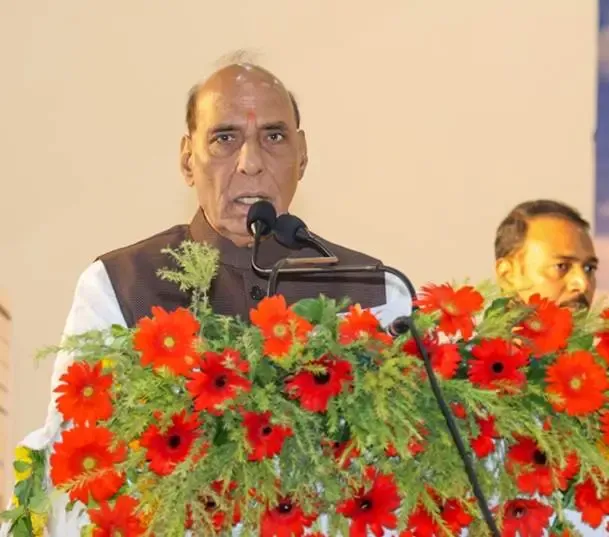Is Every Inch of Pakistan Now Within Range of the BrahMos Missile?

Synopsis
Key Takeaways
- BrahMos missile enhances India's military capabilities.
- Lucknow facility symbolizes India's self-reliance in defence.
- Approximately 100 missile systems to be produced annually.
- Defence production contributes to economic growth.
- India is recognized as a credible defence partner globally.
Lucknow, Oct 18 (NationPress) Defence Minister Rajnath Singh declared on Saturday that every inch of Pakistan is now within the reach of the BrahMos missile, celebrating the successful delivery of the inaugural batch of BrahMos missiles manufactured at the Lucknow facility of BrahMos Aerospace.
At the flagging-off ceremony in Lucknow, alongside Uttar Pradesh Chief Minister Yogi Adityanath, Singh asserted that India's defence manufacturing capabilities have entered a transformative phase, with Lucknow emerging as a pivotal hub for the nation's security and self-sufficiency.
“Lucknow is more than just a city of ‘tehzeeb’ (etiquette); it has evolved into a city of technology and industries. Every action taken from here contributes to India's security and self-reliance,” he stated.
Reflecting on the facility's inauguration in May 2025, Singh highlighted that the first batch of missiles was ready for delivery in a mere five months—labeling it a “record of credibility and capability.”
He emphasized that BrahMos has emerged as a symbol of India's indigenous capabilities, commending its speed, accuracy, and power.
“It fills us with pride that BrahMos has become the backbone of the Indian Army, Navy, and Air Force,” he remarked.
Discussing Operation Sindoor, Singh noted it illustrated that “victory has become a habit for India.”
He described the military operation as the “largest proof” of the nation’s strength, adding, “What transpired in Operation Sindoor was just the beginning, yet it made Pakistan realize that if India can create Pakistan, then when the time comes… You all are astute enough to understand.”
Singh added that BrahMos's successful execution in Operation Sindoor has bolstered global confidence in India's defence capabilities. “The practical demonstration of BrahMos has instilled confidence not just in our citizens but also worldwide,” he stated.
The Defence Minister disclosed that approximately 100 missile systems will be produced annually at the Lucknow facility, which spans 200 acres and was established at a cost of Rs 380 crore.
This project will also generate jobs for hundreds of individuals and act as “a new gateway for development.”
Singh also underscored the necessity of fortifying India's defence supply chain to ensure complete self-reliance.
“We must develop all types of technology within India—from seekers to ramjet engines—so that our supply chain remains entirely indigenous,” he stressed.
Emphasizing the importance of Uttar Pradesh's Defence Industrial Corridor, Singh noted its success relies not only on large corporations but also on the advancement of small and medium enterprises.
“In the near future, UP will transform into not only a manufacturing hub but also a center for innovation and employment,” he stated.
Highlighting the economic advantages of defence production, Singh declared, “Every missile strengthens our security while contributing to our economy. The taxes generated can fund schools, hospitals, and welfare programs for our citizens. BrahMos is not merely a weapon—it is a means to empower our society.”
He concluded by asserting that India is now viewed globally as a credible partner in defence and technology.
“Achievements like BrahMos demonstrate that ‘Made in India’ is not just a slogan; it has become a respected global brand,” he stated.
“Under Prime Minister Narendra Modi's vision for India@2047, we are constructing a fully developed and self-reliant nation. The defence sector will play a critical role in achieving that vision,” Singh added.










